Britons guzzled their way through an astonishing 6.97bn litres of soft drinks last year. According to Britvic’s Soft Drinks Review 2013, all that liquid equated to £7.21bn-worth of sales through grocery and impulse outlets. Impulse outlets accounted for nearly 25% of value sales (£1.78bn), up 1.6% on 2011, with ’glucose stimulant drinks’ or energy drinks accounting for nearly 26% of value sales versus cola’s 24%. But in volume terms, cola sales amounted to 303m litres versus energy drinks’ 175m litres.
Dave Turner, trade communications manager at Coca-Cola Enterprises (CCE), says: "One of the key things to note about soft drinks is that it is a highly resilient category. While other categories have slowed in growth in the face of economic challenges, soft drinks continue to deliver sales for retailers. In the impulse channel, soft drinks are growing at 1.6% and offer plenty of opportunities for extra sales. For independent retailers, understanding how and why their audience is consuming soft drinks will allow them to unlock genuine potential in the market."
Energy drinks may be all the rage but that doesn’t mean you should neglect cola. According to Nielsen data, the cola sector is worth £1.6bn in total grocery and £435m in impulse, with CCE cola brands worth £1.15m in total grocery and £350m in impulse. Coca-Cola and Diet Coke are the top two performing brands overall but Coke Zero had a great year in 2012, enjoying 10.5% growth (Nielsen), fuelled by its partnership with Bond movie Skyfall and growing consumer desire for low- or no-calorie options.
Although the likes of Red Bull, Lucozade and Coke are well-established as consumer favourites, drinkers are spoilt for choice as Britvic reveals there were 795 soft drink launches last year, either of brand new drinks, new flavours, new packaging or special editions.
Soft drinks are ultimately consumed to quench thirst, but the motivational factor for purchase is usually taste and manufacturers go to great lengths to offer new flavours and reinforce the taste credentials of their existing offers.
Red Bull trade communications manager, Tom Smith, says sales of flavoured energy drinks are on the increase. "Flavoured energy drinks address the number one barrier to purchase which is taste, so the introduction of NPD such as Red Bull Editions will drive this growth further by bringing more people into the category and driving incremental spend from existing ones."
Red Bull Editions are three new flavoured drinks: Red (cranberry); Silver (lime); and Blue (blueberry). Smith says they have had a hugely successful distribution build so far and have already moved into the top seven flavoured energy SKUs across the off trade and this was achieved before the £3.5m support campaign kicked off in March across the UK.
Red Bull original 250ml remains the number one cash rate-of-sale SKU in soft drinks, but also available is Red Bull Sugarfree, which has all the benefits of Red Bull but only eight calories. Sugarfree will be backed by £2m-worth of investment this year.
Meanwhile, CCE is currently backing Coke Zero with a TV campaign using the theme ’Taste The Possibilities’, but with a twist. The ad illustrates how our experience of taste can be affected by our senses. Real-life cinema-goers who ordered a Coca-Cola were given their drink in the iconic red cup. But, unbeknown to them, a Coke Zero cup was hidden inside.
The ad was filmed at Kinepolis cinema in Brussels last November. The only actor involved was the barman, who was aware of the experiment.
Before the start of the film, the experiment was revealed by a barman on the cinema screen who asked the drinkers to look inside their cups. Most of the audience were taken aback and pleasantly surprised when they pulled out the black cups to find they had actually been drinking Coke Zero.
Limited lines
Limited editions can add excitement and extra sales to the drinks chiller. When vanilla Coke first arrived in the UK in 2003, it generated sales of £54m (Nielsen) and delivered penetration of 3.2m households in its first year (Kantar). It also delivered the highest volume of any flavoured cola launch more than Diet Coke lemon in 2002, Diet Coke lime in 2005 and Diet Coke cherry in 2006.
Vanilla Coke is now back on the UK market in 330ml cans and multipacks; and 500ml and 1.5ltr PET bottles. Price-marked versions are available specifically for the convenience channel, including 330ml cans at 59p and ’2 for £2’ 500ml bottles.
The latest limited edition to join the J20 line up is pear gold, which manufacturer Britvic says delivers "a taste experience for those with a more sophisticated palate". As the 2013 summer limited edition, pear gold is a combination of pear and guava, and as such is a soft drink alternative to cider. It is available in a four-pack glass format for convenience stores.
Jonathan Gatward, GB marketing director at Britvic Soft Drinks, says: "We’ve had a great deal of success with J2O limited editions over the years as they excite consumers and capture their attention at point of purchase. We’re extremely confident that J2O pear gold will build on this, bringing new consumers into the brand and providing them with a credible soft drink as an alternative to cider, which is one of the summer’s most popular on-trend alcoholic drinks. J2O pear gold also supports our core brand positioning of being at the heart of ’adult get-togethers’ during a key period in the year."
Ribena, best-known for its blackcurrant flavours, has two new tropical varieties. The 500ml ready-to-drinks (RTDs) are mango & lime and pineapple & passionfruit. Brand owner GlaxoSmithKline says the new variants will enable impulse retailers to cash in on the sales opportunity presented by the exotic flavour sector, which is growing at 20% (Nielsen). The new drinks are available in a 99p price-marked pack (PMP) as well as standard packs. The bright orange and yellow bottles have been designed to help deliver maximum standout and shopper engagement on shelf. There is a £1.2m marketing investment behind the launch including outdoor, digital, in-store activity and sampling.
Senior brand manager for Ribena, John Price, says: "In the past 12 weeks, juice drinks with mango and/or pineapple flavours drove 48.2% growth of the total juice drinks category (Nielsen) and we are confident that the two new Ribena flavours will be a huge hit with consumers."
Tropical flavours are definitely all the rage as Volvic Touch of Fruit’s newest flavour is tropical fruits, which combines natural mineral water with a blend of pineapple, mango and passionfruit flavours.
According to Nielsen figures, Volvic Touch of Fruit enjoyed a record year for sales in 2012, with 20% in value growth thanks to a bumper marketing push promoting the drink as ’Volvic, with added enjoyment’.
Blandine Stefani, marketing director at Danone Waters (UK & Ireland) reckons 2013 is set to be an even bigger year, with a £4m marketing campaign planned including summer posters, TV advertising and experiential PR activity.
She says: "Volvic Touch of Tropical Fruits delivers a summery, holiday taste sensation, even in blizzard conditions. Flavoured water drinks are one of the fastest- growing categories within soft drinks, but until now there has been a clear gap for a tropical variant."
Volvic Touch of Tropical Fruits is available in 50cl and 1.5ltr bottles and will be supported by in-store promotions across the UK as well as strong promotional pushes with wholesalers. Volvic has also planned an in-store marketing campaign using thousands of shelf units, barkers and wobblers to draw attention to the drink.
Meanwhile, Volvic Juiced is currently being advertised on TV for the first time as part of the juicy water drink’s first ever major above-the-line marketing campaign. The 20-second ad depicts pure Volvic natural mineral water, fresh from its journey through six layers of volcanic rock, bursting through an apple tree to create Volvic Juiced. It features the tagline ’Filled with Volcanicity’. There is also a targeted poster campaign near to grocery and convenience stores, as well as sampling at train stations and city centres across the UK. Launched a year ago, Volvic Juiced contains fruit juice from concentrate and sugar. It is available in orchard apple, cloudy lemon, berry medley and summer edition citrus burst flavours.
According to Nielsen data, sales of Glacéau Vitaminwater are up 10.8% in impulse outlets. Sales will probably rise further as the drink’s new sunshine variant is the subject of a ’Try me free’ promotion. Bottles of the new citrus/guava flavour feature ’Try me free’ neck collars offering consumers the chance to send off for a full refund with every pack they buy. The on-pack graphics also communicate the benefits of the drink’s added vitamins vitamin D to contribute to the support of normal bones, and vitamins C and B6 to help reduce tiredness and fatigue.
Nick Canney, vice president sales and marketing at CCE, says: "Sunshine will be a great addition to the range and by featuring neck collars on-pack, we are helping consumers to understand the brand’s benefits further and driving trial, especially with the offer of their money back.
"To make the most impact on-shelf, retailers will be able to merchandise flavours together to create an eye-catching rainbow."
Glacéau Vitaminwater was recently the subject of a makeover with a reformulated range. All variants now contain a new stevia-based and naturally sourced sweetener and are made with spring water, all natural flavours and no artificial colours. The stevia-based reformulation now trims calories (by 30Kcal per bottle) and cuts sugar levels by 30%. In addition, all eight variants feature a revised blend of vitamins and minerals. Special neck collars communicate the new recipe using the strapline ’With vitamins to help you be at your best’.
Also available specifically for independents are trial-price collars of £1 and £1.20.
Revive from Lucozade has been a big success. Nielsen figures rate it as the number one soft drinks launch of last year and it is now worth £9m. Revive is a low calorie, lightly sparkling drink with energy-releasing B vitamins. A new strawberry with lime flavour was launched in February exclusively to BP, Boots and Tesco. BP spokesman Mark Salt says: "We were pleased to be first to market on this. In the past we have been fortunate enough to list other products first to market within our sector. This was true of Relentless, Coke Zero, Red Bull Cola and the Glaceau Vitamin Water range, to name just a few. Ensuring that your range has innovation is key to bringing customers back and we would think that BP has become well known for this."
Value offer
Forecourts should offer a combination of value tier products, price-marked packs (PMPs) and strong promotional activity, alongside premium brands to ensure they are catering for the widest possible range of shoppers. So says Adrian Troy, head of marketing for AG Barr.
"PMPs are driving the growth of the soft drinks category in the impulse channel, with Him’s research showing that 98% of people would buy a soft drink in a PMP from a convenience store. PMPs are growing in importance as they clearly indicate value for shoppers, and therefore represent an important profit opportunity. According to Nielsen, 48% of overall soft drinks growth has been driven by PMPs. Managed correctly, the introduction of PMPs can actually drive incremental sales to the overall category increasing footfall, rate of sale and loyalty."
Troy says the use of long-term PMPs has delivered year-on-year sales increases of 75% for Rockstar; 14% for Rubicon; and 7% for Irn-Bru.
CCE remains committed to offering a broad range of PMPs. At the start of this year, it introduced an updated portfolio including Coca-Cola, Diet Coke, Coke Zero and Cherry Coke 500ml PET ’2 for £2’; Fanta, Fanta fruit twist, Sprite and Dr Pepper 500ml price-marked at £1; Powerade Sport 500ml at £1; Oasis 500ml at £1; Coca-Cola, Diet Coke and Coke Zero four x 330ml cans at £1.99; and Ocean Spray 1ltr Tetrapak at £1.39.
All are also available in non-price-marked packs as well.
Away from PMPs, BP is currently running a 5ppl fuel promotion across its Connect estate. The offers vary by month and include deals such as ’Purchase two bottles of soft drinks and receive 5ppl discount on your fuel fill’. The oil company says a number of soft drinks suppliers are participating in this deal and redemption rates are high, suggesting that customers value the promotion. BP’s Salt says: "We’ve seen an increase in the conversion level of fuel-only customers and the number of high value ’Quick Fix’ customers. The promotional mechanic will continue to be evaluated to determine its effectiveness over the coming months."
Size matters
The majority of shoppers buying soft drinks in forecourt stores are looking for an immediate consumption format mainly 330ml cans and 500ml bottles. However, as nights in with friends and family become more popular, retailers need to stock take-home and multipack options too.
"By speaking to their customers, retailers can generate a greater understanding of how and where they are consuming soft drinks, and this will assist them in determining where their ranging should be split between immediate and future consumption packs," explains CCE’s Dave Turner.
"Revamping in-store displays around sporting events and big TV occasions means retailers are reaching consumers in as many different areas of their lives as possible."
Turner says the new 1.75ltr size for Coca-Cola, Diet Coke, Coke Zero, Cherry Coke and Vanilla Coke, especially for convenience outlets, is perfect for ’night in’ purchases. Apparently its launch reflects CCE’s commitment "to offering unique pack sizes to its customers in different channels".
It is targeted at convenience shoppers who are on "a single bottle mission" as it’s easier to transport than the traditional 2ltr bottle and has a lower rrp of £1.79, which makes it more affordable.
Darren Goldney, CCE sales and customer development director, says: "The decision to introduce a 1.75ltr pack format is based on strong insight into how shoppers buy take-home formats of cola in the convenience channel. We expect it to be received well by shoppers due to its greater everyday affordability, so retailers should stock up now to make the most of the sales opportunity."
pussy makes progress in forecourts
Pussy Drinks reports that it has made "significant progress" in the forecourt sector in the past six to nine months with listings in Murco, MRH, Symonds and Applegreen to name just a few.
The company has now been trading with Palmer & Harvey for a year with a regular promotional programme in place, and sales director Matt Williams says they will be working hard with the wholesaler to develop brand awareness and distribution gains.
"While shelf space in forecourts is always at a premium and often, justifiably, given to the bigger, well-established brands, we believe there should also be a strong case for stocking brands that are different to these as they add value to the category and lead to additional sales without detracting sales from other brands."
He adds that consumers are much more health conscious these days and offering a 100% natural product like Pussy can help bring non-traditional energy drink drinkers into the category.
"Ours is a completely natural product which actually tastes good, has no taurine, artificial caffeine or synthetic ingredients which means no ’crash’ that can be associated with the synthetic brands and so is ideal for the travelling consumer."
Pussy is backed by its biggest-ever consumer advertising campaign this year, which has already broken on billboard sites in London, Birmingham, Manchester, Glasgow and Liverpool including positions on the M25 and M1. It uses the strapline: "The drink’s pure, it’s your mind that’s the problem".
Says Williams: "This represents a major investment for us and will greatly assist our brand profile and awareness and drive additional demand in the forecourt sector."
retailer view
Umar Patel, operations manager, Brookfield Group:
"Soft drinks are very important to our business and overall we allocate six or seven metre bays per store. Energy drinks get a metre bay within that. It’s quite a large amount of space but we are still careful to only stock best sellers and recognised supported brands.
"We like to think of our customers going on a journey through our stores to the counter. With layout, POS and other merchandising techniques, we guide them from the door through to sandwiches and then to drinks before they reach the counter.
"Some of our stores have cordials within the ambient section but, other than that, all of our soft drinks are chilled and merchandised together as we have found this works best for impulse and ’on the go’ sales.
"Energy drinks are outselling colas now, especially those with price-marked packs (PMPs). Customers do like PMPs and they sell well, but with some brands we don’t always get a great profit margin.
"It’s definitely our younger customers who go for PMPs customers aged 30-plus will go for quality brands such as Boost, Red Bull and Lucozade.
"I’m impressed with the new packaging for Boost and it’s already selling well, and we’re happy to stock their PMP SKUs as we get a really good profit margin from them.
"It’s a similar case with new flavours younger customers are keen to try them out, such as the new Boost orange & mango 500ml cans, whereas other customers stick to the original variations.
"We like to give our customers a choice and to cater for different needs and functions but we only go for those brands which are well supported and well-known.
"We stock Red Bull, Lucozade, Boost and Rock Star."
fanta refreshment
The Fanta range has been refreshed with new flavours and updated packs.
New to the range is peach & apricot, which brand owner Coca-Cola Enterprises (CCE) says tested "extremely well" with consumers. Meanwhile red fruit, which was a "customer exclusive", is now available to all trade channels. And last year’s limited edition, mango & passionfruit, is a permanent edition. The updated range is being supported in-store and through activity that maximises key seasonal occasions such as Halloween. The brand’s typical consumers will be targeted by an ’Are you game?’ marketing campaign.
CCE’s vice president of sales and marketing, Nick Canney, says: "Fanta has huge awareness among consumers, but this is backed up by the fact that it is the best-selling brand in the flavoured carbonates sector (Nielsen).
"The wider roll out of these flavours is designed to further increase the appeal of the brand, creating a rainbow effect in store that will increase on-shelf standout and drive incremental sales. We’d advise retailers to stock up on the new flavours."
Brands in Brief
Coca-Cola Enterprises has added stevia to Sprite to give it its "most refreshing taste ever" and also lower the number of calories by 30%. Both the improved taste and the reduction in calories are communicated on pack. Sprite Zero will remain available for consumers who prefer a zero sugar, no calorie alternative.
Levi Roots mango & pineapple flavour carbonate is being renamed tropical punch to sit alongside the existing Caribbean crush flavour. Both come in 500ml and 2ltr bottles. In addition, both flavours are available in a £1 500ml price-marked pack, while Caribbean crush is also available in a £1.75 2ltr price-marked pack.
AG Barr has launched a six-month programme of heavyweight support for Irn-Bru, including three new TV commercials. The £5m ’Irn-Bru Gets You Through’ campaign will feature special packs, dedicated POS, a new website and social media support as well as the TV campaign, which is on air now.
Bulldog energy drink (original and sugar free) is now available in a four-pack, either price-marked at £1.39 or non-price-marked. The brand is also now listed by Palmer & Harvey and Londis. Mohan Khurana, general manager at brand owner Sun Mark, says Bulldog is popular thanks to its great taste and excellent value for money.
Key Vimto packs for impulse sales are the 500ml still and fizzy RTDs, which are available in standard and price-marked formats. According to Nielsen stats, both products are performing well. Vimto fizzy 500ml RTD PMP is growing at 16.2% year-on-year and Vimto Still is the second largest 400-500ml RTD PMP, growing at 26.7% year-on-year.
Triple relaunch
Navson Brands has been busy overhauling its drinks range. Saka pure natural mineral water has a new packaging design which includes an eye-catching new label along with a new super lightweight, 100% recyclable bottle. The water is sourced from a protected and remote underground aquifer, deep in the heart of the Koruglu Mountains in Turkey.
Meanwhile, chocolate milk brand Mooch has a new look as well as two new flavours cookie and marshmallow, which sit alongside the existing original chocolate variety. Packed in a can featuring a cool cow design, Mooch is made from cocoa beans, semi-skimmed milk and natural flavourings. It contains less than 1% fat, is bursting with calcium and is compliant with school regulations.
A new flavour has joined the 100% pure fruit juice Peela range, with tropical joining the existing orange and apple varieties. Upgraded packaging portrays "the purity that is passionately packed into this perfect fruit juice". One bottle contains one of your five-a-day.
Saka, Mooch and Peela are all supported by POS material as well as national PR, marketing and ad campaigns to help drive brand awareness.
Forecourt soft drinks
Soft drinks account for around 10% of sales in the average forecourt store
The busiest times for soft drinks’ sales in forecourts are during lunch (12pm2pm) and after work (5pm7pm)
Energy drinks, sports drinks and water perform above average in forecourts, compared with other convenience channels
There is a very high incidence of snacks being purchased with soft drinks at breakfast time, at lunchtime and for topup.
Over one third (36%) of all soft drinks’ baskets contains an item of confectionery; 21% have crisps; and 11% have sandwiches
30% of UK workers who purchase a food or drink item to go, do so at a forecourt
Source: Coca-Cola Enterprises Open More Business report


















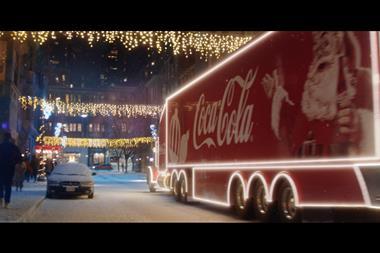
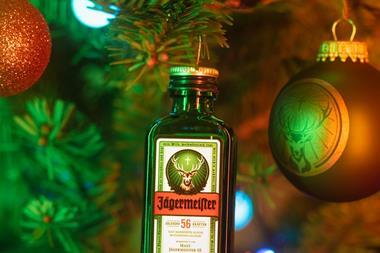
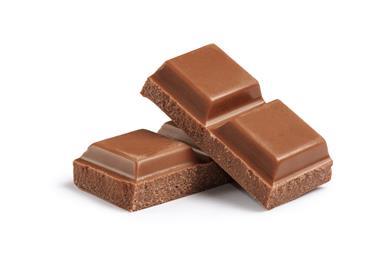
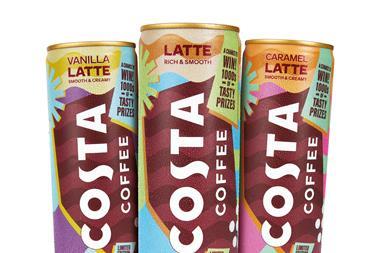
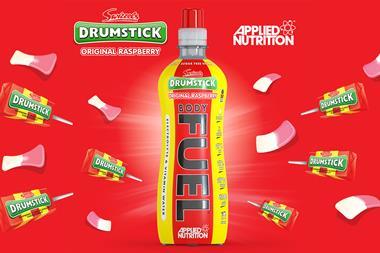
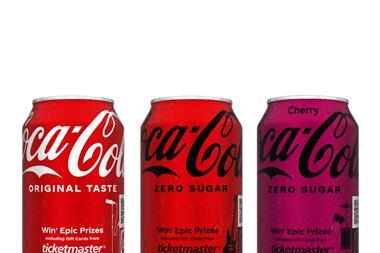
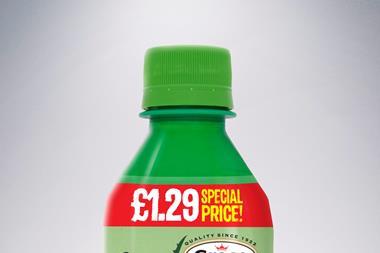
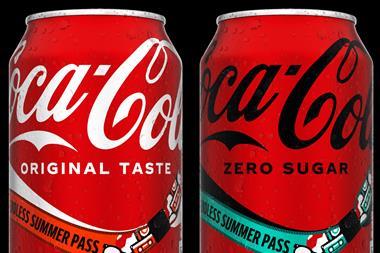
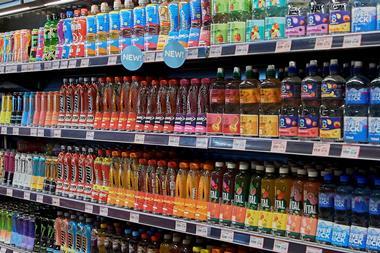
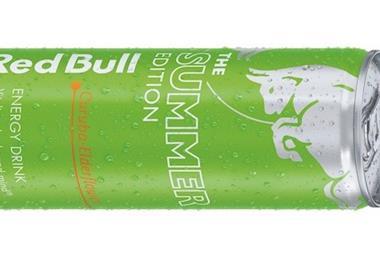
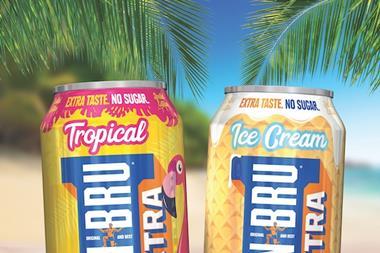
No comments yet